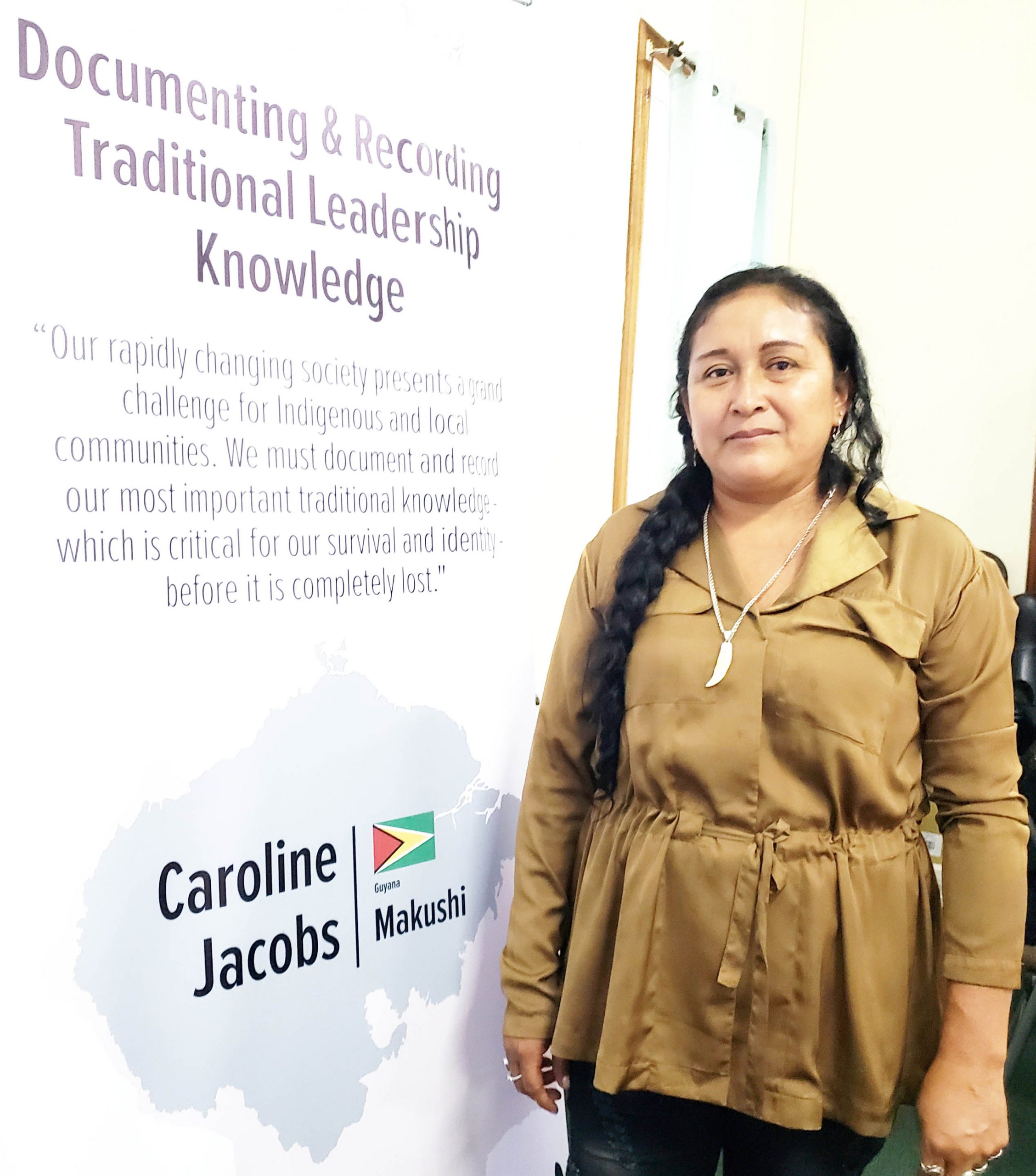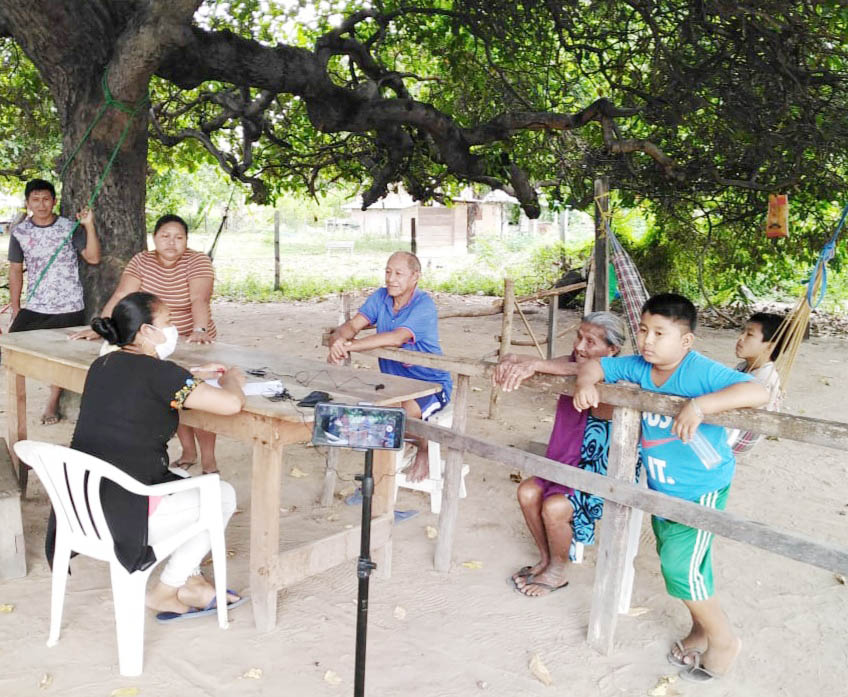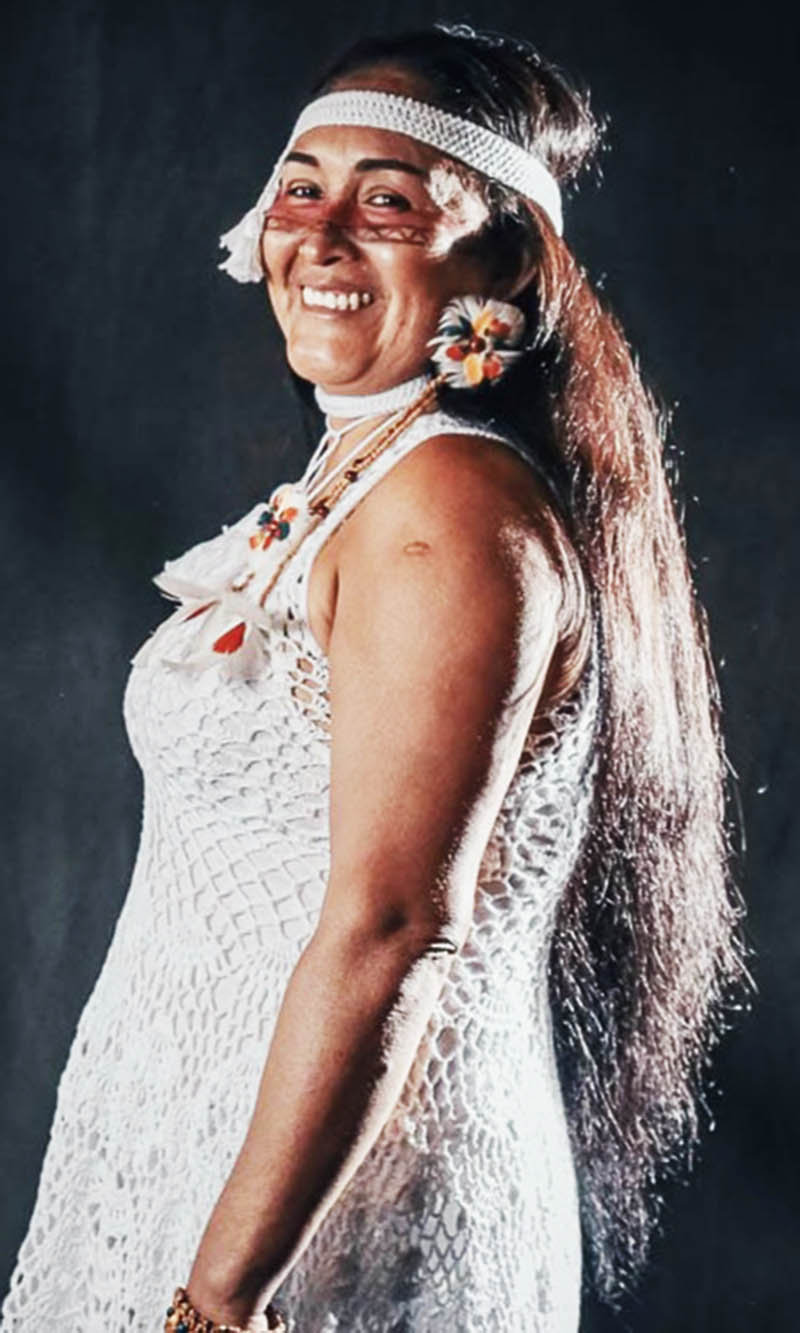By Miranda La Rose
Caroline Jacobs, 38, of Surama in the North Rupununi dropped out of the secondary department of Surama Primary at age 14 because she was bored of going to school. Now, 24 years later, Jacobs is poised to pursue a one-year online master’s degree in operational management at Salford University in the United Kingdom.
“I gained entry to the university with my CV (curriculum vitae). I never went to high school but I am about to start studies for a master’s degree. I will start on the 7th November to September, 2023. It is a dream come through,” Jacobs told Stabroek Weekend in a recent interview.
She was not successful in obtaining a place to a secondary school when she wrote the Secondary Schools Entrance Examinations and remained at Surama Primary.

“Remaining in the school after that was like nobody cared for you. I didn’t find school enjoyable anymore. I wanted to do things and school was keeping me back. Nobody taught anything much. So when I was about 14 years I decided to help my parents in the farm and learn the traditional way of life.”
How did she apply for entry to the university? Jacobs, one of five women on the Amazon Indigenous Women’s Fellowship Programme, sponsored by Conservation International, said during a visit to Ecuador earlier this year she was asked if she never pursued a university education and she said, “I have no grades. I have no educational qualifications.”
With her working and training experiences, she was advised to apply to a university to see if they will accept her to pursue a degree in management. She applied to Salford University in England and was accepted.
“The only challenge is that I have to pay for the tuition. I have already paid a 50 per cent down payment but I would really be happy if any sponsors can help to pay the balance.”
Jacobs, a women’s leader advocate, community worker and craft designer told Stabroek Weekend that when she left school she worked with her parents, Daniel and Paulette Allicock. “Not because I hadn’t completed school or hadn’t a secondary education meant I was going to do nothing. My parents were farmers, hunters and outstanding traditional craftsmen. My dad made jewellery using forest products at Surama and I told him I wanted to learn what he was doing. He saved the teeth of the animals he hunted for necklaces and earrings. He carved images out of the leopard wood. I fell in love with what my parents were doing and admired how by using the natural resources they earned their living.”
She started making earrings and necklaces and learned the art of making hammocks. She makes chokers, anklets, garlands, bags and does her own designs.
“I learned and now I share my knowledge in the community and with whoever is willing to learn.
These days I don’t have the time to do the craft as I did in the past and I focus more on designs. A lot of people ask me to help them.”
As a craft designer she took part in a craft exchange of knowledge programme in Rio De Janeiro, Brazil. “I came back and shared the knowledge I had gained.”
Work, research, training
Today, Jacobs is employed as the logistic officer with the North Rupununi District Development Board (NRDDB) where her job entails working with wildlife clubs in the North Rupununi. She is engaged in a part-time ‘smart’ project in which she is recording the outstanding work of women leaders in the North Rupununi District. She is also engaged in the women’s fellowship programme.
The NRDDB recommended her for the women’s fellowship in which she focused on traditional leadership knowledge, which, according to her, was dying rapidly especially with the onset of the COVID-19 pandemic. “The elders were dying without passing on their knowledge. Traditional leadership was not recorded or documented. It was a challenge. No one was gathering it and the issue was how to do it. That was when the NRDDB nominated me and we submitted a proposal. I was accepted into the fellowship.”
She started her project with COVID-19 awareness meetings in the communities of Surama, Yakarinta, Toka and Karasabai. She spoke to residents in the communities about her project to capture and record traditional leadership knowledge.
She chose the four communities because of their geographical locations and because she wanted to compare the similarities and differences on how the Macushi people survived and connected even though they lived in different communities.
“I chose Karasabai for the mountains, Toka for the savannahs, Yakarinta for wetlands and Surama for its forests.”
She has compiled her findings which look at the histories of the communities, strong communal/community leadership and governance, traditional leadership structures, togetherness, respect for elders, respect for the environment and biodiversity, sacred sites and the value of traditional knowledge among other topics.
It was no surprise she found Indigenous women living in harmony with nature since time everlasting. However, she said, the Macushi women in the past were never given the opportunity to be leaders even though they were advisors and the brains behind many of the developments and activities in communities. For instance, she said, women in the community reached out to the wives of the toshaos (chiefs) with their ideas and the wives in turn passed their ideas and knowledge to them. Those ideas were presented to the communities as the chiefs’. In recent times, women were elected toshaos and councillors of the villages.
Jacobs, herself, was also a village councillor, a past deputy toshao/senior councillor of Surama Village Council from 2012 to 2018. She declined the nomination in 2018 for the post of councilor to allow for other women to become involved in the affairs of the village. At a young age, she was a vice chairman of the Surama Community Development Council before the community gained its land title and village status.
“I have combined the findings because I have found many similarities on how leadership was carried out in the past. I have a lot of stuff. The end product of my project is a publication, The Missing Truth of Macushi Traditional Leadership Knowledge – It’s Importance, Need and Value.”
Jacobs has also produced a video documentary, The tale of the two brothers and Macushi Conservation. It is based on the story told to her by the elders in the communities. “The story is about two godly brothers – Incheekeedang and Anyeegie (spelt as pronounced) and how they travelled from Karasabai to Surama.
The research of her findings is awaiting publication for print and online.
As NRDDB’s logistic officer, her responsibilities include monitoring the activities of seven wildlife clubs. The clubs are found at Fairview, Surama, Wowetta, Bina Hill, Rupertee, Toka, and Yupukari. Three of the clubs were formed through the Sustainable Wildlife Management programme in collaboration with Iwokrama International Centre for Rainforest Conservation and Develop-ment (Iwokrama).
“Iwokrama is the institution that pushed me to where I am. At 15 years they gave me the opportunity to train as the first community environmental worker in Surama. The training involved capacity building skills, communication skills and simple book keeping.”
Her part time job, she said, is the smart project that targets Indigenous women’s leaders in the NRDDB area. She is creating a documentary as part of her project, which ends in February 2023.
“Growing up in Surama, I saw women struggle to get their voices heard. Most times when women were nominated for office in the community they declined. Many women have good ideas but they do not get the support from their husbands or families. My objective is for women to learn and to work side by side with men. At meetings when women try to stand up and voice their opinions and are shut down, I stand up and ask that the woman be heard. We need more Indigenous women’s leaders because we are the backbone in the communities. I encourage women to come out to meetings. My objective is to work with and encourage women to take up leadership positions in the community. Women in our communities are not as shy as before.”
University of CMRV
In 2020 she was hired as a consultant by The Consultancy Group (TCG) as a local woman’s expert to look at how outside organisations work with Indigenous communities and to develop basic guidelines on how they should consult with Indigenous communities. Her work is still in progress.
In 2009 she was hired by TCG as a supervisor on the Malaria Testing and Treatment Adherence Survey among gold miners in Port Kaituma, Matthew’s Ridge and Baramita in Region One – Barima/Waini.
“I was one of six supervisors chosen from 291 applicants. When we were introducing ourselves all the others stated the colleges and universities they attended. “When I introduced myself I jokingly said I was educated at the ‘University of CMRV’. I hadn’t the university qualifications but I knew how to do field work and make PowerPoint presentations. I was lucky to be selected.”

CMRV is the abbreviation for the Community Monitoring, Reporting and Verification programme, a programme Jacobs was a part of in 2014. It was done in collaboration with the NRDDB, Iwokrama and the Global Canopy Programme. She worked on the NRDDB CMRV programme between 2012 and 2018.
The third of four siblings, she recalled her mother telling her, “‘Pinky (as she is known at home) go take that training.’ I have four children, all boys. She would say, ‘I will look after them.’ One of my sisters also took care of my first child when I had to undertake some training in the city.”
She took advantage of a number of training opportunities offered by the Amerindian Peoples Association, the then Ministry of Indigenous Peoples Affairs, Iwokrama, CI and the World Wildlife Fund, among others. She also did part time jobs with some of them. She underwent courses in project management, business management, data analysis, capacity building, financial management, writing proposals, botany course, social issues that dealt with among other issues violence against women and children, and natural resources management.
“These helped me along and opened my eyes to many things. I have travelled overseas and most recently to Ecuador as part of the women’s fellowship to discuss, among other topics, issues affecting indigenous women.”
Jacobs has also assisted her mother, who is the coordinator of the Macushi Research Unit in training youths and in particular young women leaders in redefining gender roles with the aim of leading them to pursue desired goals.
“With the knowledge I have gained I assist in facilitating PowerPoint presentations and videos to make the sessions lively so they could see the reality. We have about 13 Macushi researchers in the 20 communities in the North Rupununi. Whenever they ask for help I assist voluntarily. That is something I really like doing, especially with the women. It is not all about payment for me. I also do a lot of voluntary work.”
For her voluntary work she was presented a youth award by the Ministry of Youth, Sport and Culture for outstanding community volunteer service. “This award made me want to do more for my community. I never expected to receive an award because helping is something I do naturally. Up to today I am still doing voluntary work.”





